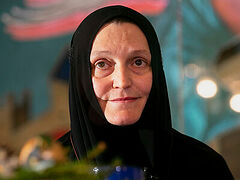 A Bell-Ringer. Artist: Sergei Troshin
A Bell-Ringer. Artist: Sergei Troshin
“If all knew what sorrows await monks, no one would ever become a monk, but if all knew what joys await monks in the Heavenly Kingdom, everyone would go to monasteries without hesitation,” St. John Climacus wrote in The Ladder of Divine Ascent, his amazing and classic book about monasticism for all ages.
I think that most sincere Orthodox Christians have faced this difficult question at some point in their lives: whether to go to a monastery, or to live in the world. Reading the works of the Holy Fathers on monastic life and the Lives of the venerable fathers and mothers, you are imbued with the light of their thoughts and love for this way of life. But when you start applying it in your own miserable life and sinful soul, you realize that you are not just unworthy, but spiritually weak and unlikely to be able to bear such a burden. And yet some mysterious voice with its Heavenly notes calls us to this difficult spiritual path. Perhaps our Guardian Angels gently touch our sinful souls.
When the will is increasingly inclined towards such a decision, most go in search of an elder or an experienced father-confessor for advice. Many saints did this. For example, St. Seraphim of Sarov went to Kiev to visit St. Dosifei (in fact, the holy Eldress Dosithea). So do many of our contemporaries. For example, Hieromonk Vasily (Roslyakov), the New Martyr of Optina, traveled to seek advice from Archimandrite John (Krestiankin) at the Pskov-Caves Monastery. They did not do it just to dispel their doubts, but to learn the will of God about themselves, whether God’s blessing was with them for this thorny, sorrowful path.
The author of these lines himself, following the example of the saints and simply pious predecessors, went to receive a blessing from an elder, an archimandrite who was very experienced in spiritual life. And he did not immediately receive his blessing for monastic life, but for another year he would travel to speak to this father-confessor. At the same time, he prayed to God that He would reveal His holy will. During that year, he became spiritually stronger, and his decision to become a monk became mature. Then the priest blessed him to become a monk.
But if one does not know any elders or experienced father-confessors, what should he do? He certainly shouldn’t give up. Back in the nineteenth century, St. Ignatius (Brianchaninov) described such problems and gave an exhaustive answer. In volume 5 of An Offering to Contemporary Monasticism, in chapter 13 entitled, “On Living According to Counsel,” he writes:
“The previous chapter compares spiritual life, provided by Divine Providence to our time, with grains. Such a life is based on guidance to salvation by the Holy Scripture and the works of the Holy Fathers, with counsel and edification taken from modern fathers and brethren. In the proper sense, this is the obedience of the ancient monks, only in a different form adapted to our weakness, mainly spiritual weakness. Spiritual guides announced the will of God to ancient novices immediately and directly. But in our times, monks themselves must seek the will of God in the Scriptures, and therefore they must face frequent and prolonged perplexities and errors. Previously, success was achieved quickly according to the properties of the activity; now it is inert, again according to the properties of the activity. Such is the favor of our God for us: we must obey Him, and worship Him with thanksgiving.
“Our modern monastic life according to the Scriptures and the advice of fathers and brethren is consecrated by the example of the father of monasticism, St. Anthony the Great. He was not in obedience to an elder, but being a novice, he lived separately, and took guidance from the Scriptures and from different fathers and brothers.”[1]
St. Ignatius writes elsewhere that it is necessary to read the Holy Fathers and compare the counsel of successful brethren with them, accepting what is in accordance with the Holy Fathers and rejecting what is contrary to them.
With regard to the choice of monastic life, this holy hierarch expresses a very profound and interesting thought in his volume, Ascetic Experience, in the dialogue between a layman and a monk on Monasticism:
Layman: How can a Christian know if he is capable or incapable of the celibate life? In my opinion, this question should make it very hard for anyone intending to take up monastic life.
Monk: Whoever desires (has a good intention) is capable. Just as in man’s immaculate state he was allowed to choose either to remain in this state or to leave it, so after the renewal of nature he was allowed to choose to acquire a nature renewed in all its development, to use it only to the extent needed for salvation, or to remain in his fallen state and develop a fallen nature. The renewal of nature is the gift of the Redeemer. For this reason every Gospel virtue is chosen by a good intention, but is given by Christ to him who chooses it as a gift. A good intention is proved by forcing yourself to practice virtue, and virtue is sought from God by diligent and patient prayer. All the virtues of the Gospel are not characteristic of fallen nature; an ascetic must force himself to cultivate all of them; he must ask God for everything with humble prayer, combined with heartfelt weeping. Like other Gospel virtues, celibate life is chosen by a good intention; the sincerity of a good intention is proven by struggling with desires of the fallen nature and restraining the body by ascetic labors; the gift of purity is sought from God by an awareness of the inability of the fallen nature to live a pure life, and by ardent prayer, full of compunction. The gift is sent down from Heaven by the overshadowing of the grace of God, which transforms and renews nature.”
In other words, whoever walks will pass through; likewise, whoever prays fervently to God and tearfully repents to Him will proceed.
A great saint of the early twentieth century, the Venerable Silouan of Mt. Athos, taught that in order to know the will of God about yourself you must pray to God zealously about it, and only then go and ask your father-confessor. But you also must accept his first word, and not argue with him—because as a human being your father-confessor can succumb to your influence and the voice of God will be drowned out in his soul.
Therefore, if you have the determination to devote yourself to God in monastic service, after praying diligently you can receive the blessing from an ordinary priest—go to a monastery for a few weeks and try it. Then, taking a vacation and praying again, go to one of the monasteries you like. There, after talking with the brethren, and most importantly with the father-confessor, you can make the final decision to withdraw from the world and engage in spiritual warfare.
This author knew a dentist who in the 1990s, after divorcing his wife, decided to move abroad. He sold his apartment and stopped by a monastery to pray a little before leaving. He liked it there so much that he wanted to live there on obedience for a while. After some time, the dentist took monastic vows and stayed in the monastery forever. God led him to monastic life through such a tortuous journey.
In any case, before taking monastic vows a person will live in a monastery for several years, passing through the probation period in obedience to the abbot. The Russian word for probation (noviciate) is “iskus”, or “testing”, which can be understood both as temptations from the enemy and as the art of fighting him. During this time the will of God about this novice will be revealed to the abbot, the father-confessor, and the person himself. In monasteries they usually say, “If a person has come to us, it means that God has called him.” It remains only to respond to this calling with humility and grateful prayer with repentance. May God preserve us.



